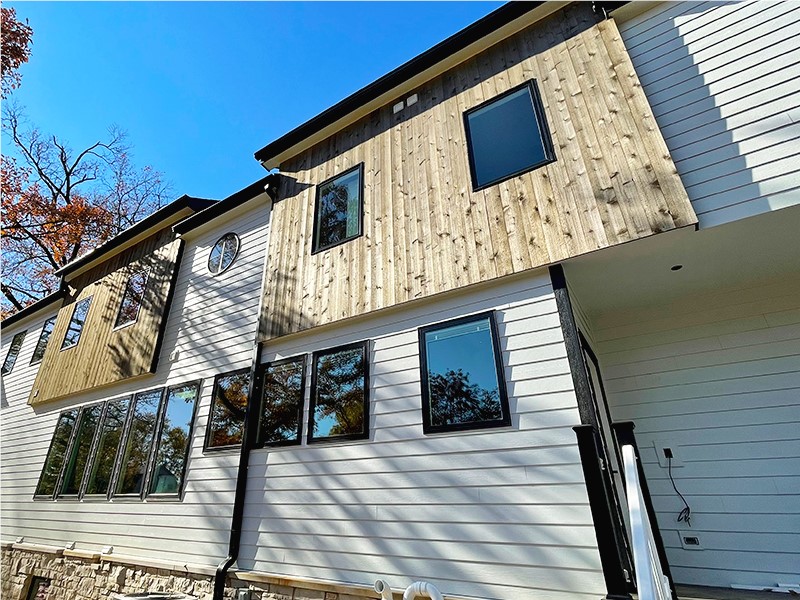
When it comes to protecting and beautifying your home, choosing the right siding is crucial. With so many options on the market, deciding which is best for your needs can take time. Each type of siding has unique benefits and drawbacks, from traditional wood and vinyl to newer materials like fiber cement and engineered wood. This article will explore the different siding options available and help you determine the best fit for your home. In addition, we've covered whether you want to enhance curb appeal or energy efficiency.
Pros and cons of fiber cement siding
This is a popular choice among homeowners due to its durability and low maintenance requirements. This type of siding is made from a mixture of cement, sand, and cellulose fibers, which gives it the strength and durability of traditional cement with the added benefits of wood.
One of the biggest pros of this siding is its durability. It is resistant to termites, fire, and extreme weather conditions, making it an excellent option for homeowners who live in areas prone to natural disasters. It also has a long lifespan, often up to 50 years or more, with proper maintenance.
Another advantage is its low maintenance requirements. Unlike wood siding, it doesn't require regular painting or staining and doesn't rot or warp as other types of siding can. It also has a non-combustible rating making it fire-resistant.
Fiber cement siding is also versatile; it comes in a wide range of styles, textures, and colors, making it easy to match the look of your home. In addition, it can mimic the look of wood, stucco, and stone, giving homeowners a wide range of options.
However, this kind of siding has its drawbacks. One of the main cons is that it can be expensive to install, often costing more than other types of siding. It also requires specialized tools and equipment, making installation more difficult and time-consuming. Additionally, the material is heavy and brittle, so it is vital to ensure that the contractor installing it is well-trained and experienced.
Pros & cons of vinyl siding
Vinyl siding is a popular choice among homeowners due to its affordability, durability, and low maintenance requirements. This type of siding is made from a kind of plastic called polyvinyl chloride (PVC), known for its resistance to moisture, fading, and impact damage.
One of the main pros of vinyl siding is its affordability. It is one of the most cost-effective siding options available, making it an excellent choice for homeowners on a budget because it is one of the easier materials to install.
Another advantage of vinyl siding is its low maintenance requirements. Unlike wood siding, it doesn't require regular painting or staining and doesn't rot or warp as other types of siding can. Vinyl siding is also resistant to moisture, which can prevent mold and mildew growth, and it is also fade-resistant, which can keep your home looking new for years to come.
Vinyl siding also comes in a wide range of styles, textures, and colors, making it easy to match the look of your home. In addition, you can have the appearance of wood, stucco, and stone, giving homeowners a wide range of options to choose from.
However, vinyl siding also has its drawbacks. One of the main cons is that it can be less durable than other types of siding in extreme weather conditions such as high winds, hail, and hurricanes. It is also less energy-efficient than different types of siding, like fiber cement, wood, or brick, and it can warp or crack in freezing temperatures. Additionally, it can be challenging to repair, and if it's not installed correctly, it can lead to problems like buckling or warping.
Best Siding for your Home: Taking into consideration weather and fire resistance
When choosing the best siding for your home, it's essential to consider weather and fire resistance factors. Different types of siding have varying levels of durability and protection against these elements, so choosing the one that best fits your needs is essential.
One of the most durable options for weather resistance is fiber cement siding. This type of siding is made from a mixture of cement, sand, and cellulose fibers, which gives it the strength and durability of traditional cement with the added benefits of wood. It is resistant to termites, fire, and extreme weather conditions, making it an excellent option for homeowners who live in areas prone to natural disasters such as high winds, hail, or hurricanes.
The other is vinyl cladding. There are numerous styles that are beautiful, most are fade-and-scratch resistant, and offer color locking. Plus, an equally durable manufacturer’s warranty is offered to back the homeowner’s investment.
Best Siding for your Home: Taking into consideration installation
When choosing the best siding for your home, it's essential to consider the ease of installation. Some types of siding are heavy and require specialized tools and equipment, making installation more difficult and time-consuming. It's essential to consider the weight and complexity of the materials before making a decision on siding installation.
One of the most popular options for easy installation is vinyl siding. This type of siding is made from PVC, which is lightweight and easy to work with. It can be easily cut and shaped to fit your home and installed using basic tools.
Best siding for your home, taking into consideration energy efficiency and aesthetics.
When choosing the best siding for your home, it's crucial to consider energy efficiency and aesthetics. Different types of siding have varying levels of energy efficiency and can affect the overall look of your home, so choosing the one that best fits your needs is essential.
One of the best options for energy efficiency is insulated vinyl siding. This type of siding has a foam backing that helps to insulate your home, reducing heat loss in the winter and heat gain in the summer; this can help to lower your energy bills and make your home more comfortable year-round. Insulated vinyl siding also comes in various colors and styles to enhance your home's aesthetic.
Another option for energy efficiency is fiber cement siding. As we stated before, this type of siding is made from a mixture of cement, sand, and cellulose fibers, which gives it the strength and durability of traditional cement with the added benefits of wood.
Best siding for your home, taking into consideration versatility and durability.
When choosing the best siding for your home, it's crucial to consider both versatility and durability. Different types of siding have varying levels of versatility and durability, so choosing the one that best fits your needs is essential.
Fiber cement and vinyl siding are great options for versatility and durability. Both provide good insulation, come in a wide range of colors and styles, and are resistant to weather and fire. It's essential to consider the cost, maintenance, and installation requirements before deciding - we can help by providing a siding estimate.
Best siding for your home, taking into consideration cost and warranty
When choosing the best siding for your home, it's crucial to consider price and warranty. Different types of siding have varying prices and warranty options, so choosing the one that best fits your needs and budget is essential.
Regarding cost and warranty, vinyl and fiber cement siding are great options. Both are affordable and come with options for long-term manufacturer warranties. It's also important to note that not all warranties are created equal, so it's essential to read the fine print and understand the terms and conditions of the warranty before making a purchase.
When choosing the best siding for your home, it's crucial to consider factors such as weather and fire resistance, installation, energy efficiency, aesthetics, versatility, durability, cost, and warranty. Each type of siding has unique benefits and drawbacks, so choosing the one that best fits your needs is essential.
For example, fiber cement siding is excellent for its versatility and durability, while vinyl siding is a cost-effective option with low maintenance requirements. Considering these factors is vital before choosing a siding that will protect and enhance your home for years. When you’re ready to proceed with your home’s exterior remodeling, contact us for an estimate.
Tags
Subscribe to Pro Home 1's Blog





Comments